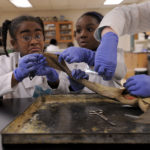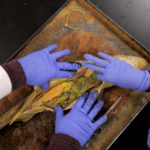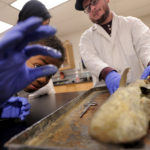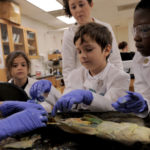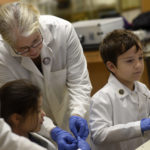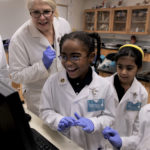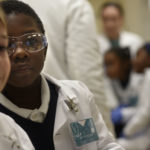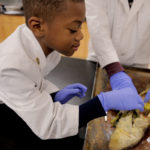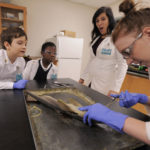The dorsal fins were enough to draw in her classmates, but 6-year-old Marlee Howell found herself focused on something else. An eyeball.
“I want to touch it, but it’s so gross,” said Marlee, one of nine elementary school students to attend a recent lab hosted by UMW Associate Professor of Biology Deb O’Dell.
The tiny scientists – second- through third-grade accelerated learners from The Merit School at Stafford – came to the Jepson Science Center to dissect a shark. Talk turned to things like the tooth fairy, video games and slime at points during the lesson, but these smaller-than-usual university students learned some pretty big things.
“Experiences like these drive a lot of their career aspirations,” said Merit School teacher Amie Canter. “A lot of them already know what they want to be when they grow up.”
The future professionals, who might one day serve the Fredericksburg area as healthcare workers and scientists, donned miniature lab coats, goggles and blue latex gloves. With the help of three student aids from O’Dell’s Comparative Anatomy class, they sliced through the sandpapery skin of dogfish sharks, exploring the animal’s skeletal structures, nervous systems and more.
“It’s important for kids to know how fun and exciting science can be,” said senior biology major Brandon Fincham, who plans to go into teaching. “There’s something special about seeing kids’ eyes light up when they get excited about something like dissecting sharks.”
The group learned the difference between veins and arteries, located the sharks’ livers and colons, and discussed the functions of major internal organs.
“The heart looks amazing,” said 8-year-old Kaleb Carter.
Canter makes it her mission to get her students out of the classroom as often as possible. They’ve visited Mary Washington Healthcare, met with mayors and lawmakers, even trekked to the White House. The class’s partnership with UMW, including Associate Professor of Chemistry Leanna Giancarlo, Professor of Biological Sciences Joella Killian and Assistant Professor of Biological Sciences Parrish Waters, is ongoing.
“We are truly grateful for the educational opportunities the professors at UMW have provided,” said Canter, who plans another Mary Washington visit in March.
Junior biology major Brittany Pennington, who worked with the children during last month’s lab, said a similar opportunity in elementary school might have helped push her toward a career in the lab.
“Something like this, especially at this age, is important to attract more students into the science fields,” O’Dell said, “to show them what’s new and cool … to show them some of the things they can do.”
